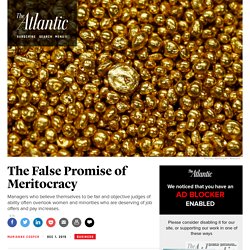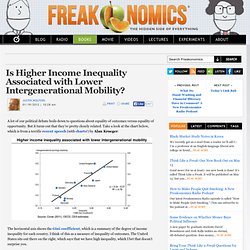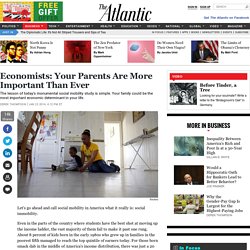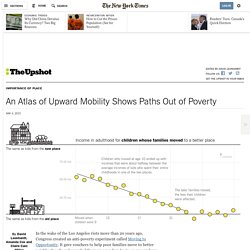

The False Promise of Meritocracy. Americans are, compared with populations of other countries, particularly enthusiastic about the idea of meritocracy, a system that rewards merit (ability + effort) with success.

Americans are more likely to believe that people are rewarded for their intelligence and skills and are less likely to believe that family wealth plays a key role in getting ahead. And Americans’ support for meritocratic principles has remained stable over the last two decades despite growing economic inequality, recessions, and the fact that there is less mobility in the United States than in most other industrialized countries. This strong commitment to meritocratic ideals can lead to suspicion of efforts that aim to support particular demographic groups. For example, initiatives designed to recruit or provide development opportunities to under-represented groups often come under attack as “reverse discrimination.”
But is this true? Emilio J. Hiring managers do not expect this outcome. Is Higher Income Inequality Associated with Lower Intergenerational Mobility? A lot of our political debate boils down to questions about equality of outcomes versus equality of opportunity.

But it turns out that they’re pretty closely related. Take a look at the chart below, which is from a terrific recent speech (with charts!) By Alan Krueger: State of Working America. Robert Putnam: Class Now Trumps Race as the Great Divide in America - Garance Franke-Ruta. Major changes in family structure among high-school educated whites should reshape our understanding of who has social capital in America, he says.

Robert D. Putnam, author of Bowling Alone: The Collapse and Revival of American Community, issued a strong warning to anti-poverty advocates at a forum on social connectedness at the Aspen Ideas Festival Saturday, urging the audience to get beyond talking about poverty and race and start thinking about social mobility and class instead. "Those two conceptual moves, framing it as poverty and thinking about it as a matter of race, have a very deep history... and I think both politically and analytically that's an almost fatally flawed framework," said Putnam, the Peter and Isabel Malkin Professor of Public Policy at the Harvard Kennedy School, in response to remarks from co-panelists Anne Mosle, vice president of policy at the Aspen Institute, and Mario Small, chair of the Department of Sociology at the University of Chicago.
Niall Ferguson: A Conservative Take on America's Economic Divide - Newsweek and The Daily Beast. The Self-Destruction of the 1 Percent. Stalled upward social mobility in America [UPDATED 2/14/12] Flickr photo by AtleBrunvoll Rana Foroohar’s cover story in TIME (Nov. 2011) is entitled What Ever Happened to Upward Mobility?
![Stalled upward social mobility in America [UPDATED 2/14/12]](http://cdn.pearltrees.com/s/pic/th/stalled-mobility-america-41571464)
Poor kids who do everything right don’t do better than rich kids who do everything wrong. Source: Data from Richard Reeves and Isabel Sawhill Not a day seems to go by where we're not reminded that inequality is growing in America.

Economists: Your Parents Are More Important Than Ever. The lesson of today's monumental social mobility study is simple.

Your family could be the most important economic determinant in your life. Let's go ahead and call social mobility in America what it really is: social immobility. Even in the parts of the country where students have the best shot at moving up the income ladder, the vast majority of them fail to make it past one rung. The American Dream is an Illusion. A combination of cheap transportation and enormous disparities in income across countries has inspired unprecedented numbers of people to uproot: there are now 230 million people around the world living outside the country of their birth, 46 million of them in the United States.

Not surprisingly, immigration tends to flow from poor places to rich ones: in the world’s 18 richest countries, immigrants constitute 16 percent of the population. If one includes those who are descendants of recent immigrants, that percentage is significantly larger and is certain to grow, since immigrants generally have more children than domestic populations. Consider that, in 2010, 13 percent of the U.S. population was born outside the country, yet 24 percent of those younger than 18 had foreign-born parents. Policymakers in rich countries have tended to treat immigration as a challenge, but a surmountable one.
An Atlas of Upward Mobility Shows Paths Out of Poverty. Continue reading the main story Income in adulthood for children whose families moved to a better place The same as kids from the new place Children who moved at age 10 ended up with incomes that were about halfway between the average incomes of kids who spent their entire childhoods in one of the two places.

The later families moved, the less their children were affected. Moved when children were 9 The same as kids from the old place. When Upward Mobility Becomes a Health Hazard. Denying instant gratification in deference to long-term goals is virtuous, people tell me.

Those people might be right. Psychologists call it self-regulation or self-control. And together with conscientiousness, it’s at least a trait (or a coping mechanism) that’s reasonably good at predicting a young person’s future. People with less self-control are more likely to end up where the world tells them to go. Even in the worst circumstances, people with the most self-control and resilience have the highest likelihood of defying odds—poverty, bad schools, unsafe communities—and going on to achieve much academically and professionally.